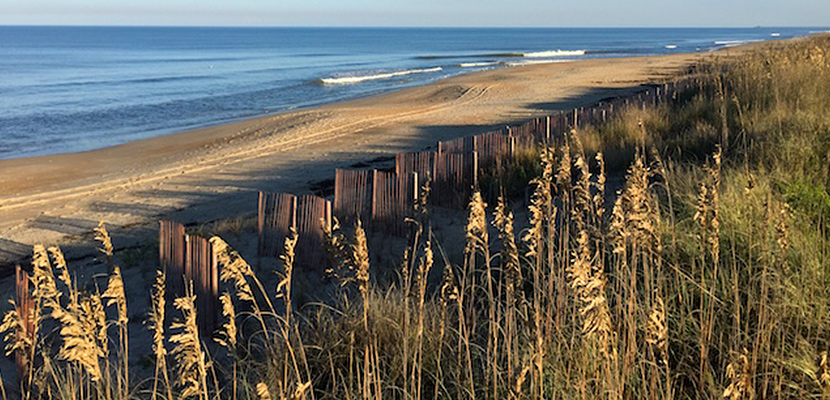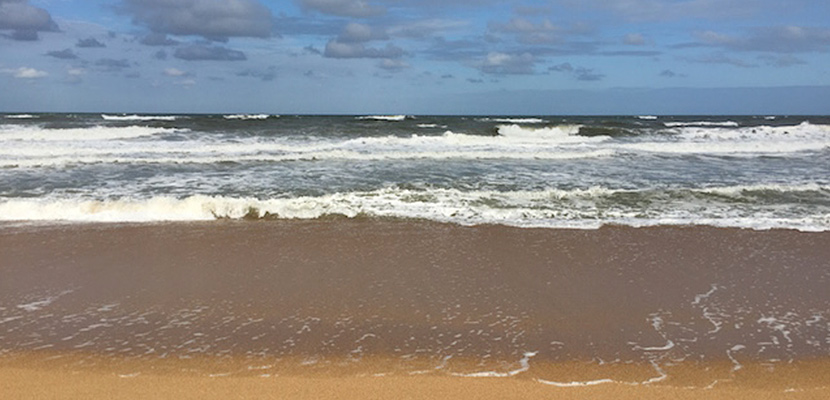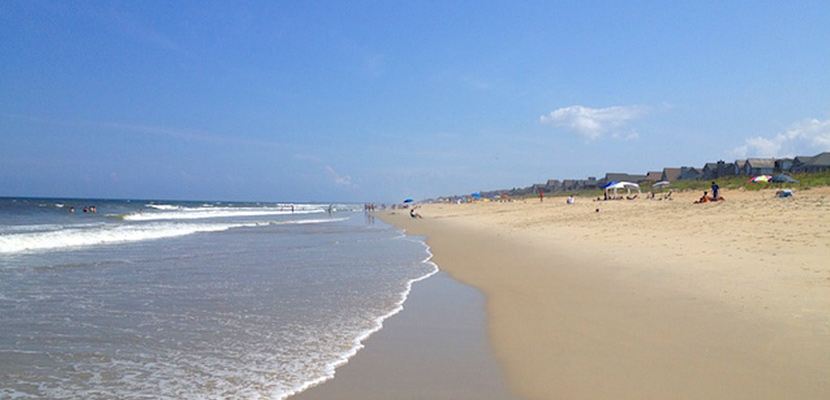PLEASE NOTE:
The Town of Duck Surf Rescue does not maintain lifeguard stations in Sanderling.
Surf Rescue does place Red Flags at marked Sanderling community dune walkovers when conditions make swimming dangerous.
RED FLAGS = NO SWIMMING
If Red Flags are flying DO NOT go in the water – you put yourself and others including lifeguards at risk.
Conditions can change quickly, so be alert. Just because red flags are not flying it does not mean that the ocean is safe – there is always a risk when swimming or wading in open waters.
Never swim alone.
Look for rip currents and strong shore breaks. Strong rip currents can occur very near shore and can occur in conditions when red flags are not flying quickly carrying a swimmer away from shore.
If you have been drinking alcohol, do not go in the water.
Storms approach quickly, so be alert. If a storm is approaching immediately leave the water and the beach and seek shelter.
Do not use rafts or other flotation devices as a substitute for swimming ability. Winds and currents can push swimmers using flotation devices away from shore.
Tents and Cabanas
Tents and Cabanas are subject to size restrictions by the Town of Duck for safety reasons including mobility for Surf Rescue personnel. The maximum tent size is 12′ x 12′. Tents or cabanas may not be tied together and there should be a minimum of 10′ between each tent or cabana. There should be at least 15′ between the dune and a tent or cabana.
Please feel free to flag down a lifeguard on an ATV if you need assistance or to ask questions.
Be aware of your location on the beach indicated by beach markers. Call 911 in the event of an emergency.
For additional information on beach safety, please visit: www.townofduck.com/surfrescue-duck/
For additional information on rip current safety please visit: National Weather Service Rip Current Awareness and the National Weather Service Local Forecast.
Dune and Beach Rules
The dunes are our first line of defense against storms. The Town of Duck and the Sanderling Community are committed to maintaining and nourishing our dune system. We ask that all visitors and residents help us maintain our fragile dune system, so that we may all enjoy our beautiful beach for years to come. Please also read the section below entitled “Help Protect The Sea Turtles”.
Always use designated walkways for beach access.
Never walk, climb, dig, jump, play, slide or rappel on any part of the dunes. Do not let dogs walk, climb or dig in the dunes.
Never store personal beach equipment or items on any part of the dune including under the stairs or beside the stairs or walkovers.
Never store personal beach equipment or items behind dune fencing.
Never hang personal items on dune fencing or use dune fencing to tie down or anchor personal beach equipment like tents, cabanas or kites.
Never remove, damage or in any way destroy dune vegetation.
Always remove personal items and beach equipment from the beach at the end of your visit each day.
For public safety and environmental reasons, the Town of Duck requires that all unattended beach equipment, including but not limited to umbrellas, tents, shades, cabanas, chairs, etc. be removed from the beach after 5:00 p.m. For the protection of the dunes, equipment may not be stored anywhere in the dune area as stated above. The Town will remove and dispose of items left in violation of this rule as litter.
Always refill beach holes dug during your visit to the beach. Holes left unfilled are a safety hazard to rescue personnel or to anyone traversing the beach at night or in early morning hours.
Beach Fires and Fireworks are strictly forbidden by the Town of Duck. Violators may be fined up to $500.00.
Dogs are allowed to be off-leash on the beach as long as the dog is under the owner’s immediate control. The Town of Duck’s ordinance mandates the removal of feces, which must be placed in a sanitary container. Do not bury dog feces in the sand.
Never leave litter on the beach. Properly dispose of litter using trashcans located near each community walkway at the street level or at your residence.
Landing and Launching of personal watercraft on the Town’s beaches is prohibited by the Town of Duck.
Motor Vehicles are not allowed on the beach between May 1 and September 30. At other times of the year vehicles are allowed, but there are no public access points in the Town of Duck or the Sanderling community.
Help Protect the Sea Turtles
While the beach and dune rules outlined above are in place to insure the safety of all beach visitors and to enhance everyone’s visit to the beach, they are also in place to protect our wildlife, in particular nesting sea turtles.
Sea turtles nest in our area between May and August, although hatching can occur into late fall. The turtles make their way from the sea to lay their eggs in the sand in or near the dunes. Sometimes nests are isolated, but often they are in areas populated by beach visitors including near walkways. The eggs incubate in the nests until the hatchlings are ready to make their way to the shore. Nature itself puts up barriers to make the hatchlings race to the shore a dangerous trek. Unfortunately, people are often unaware that their actions also impede the hatchlings race for survival.
Whether you are a visitor to Sanderling or a resident, we ask for your cooperation in protecting our beach and dunes that is shared by sea turtles as well as a wide variety of other wildlife. Please stay off the dunes. Do not store beach equipment anywhere in the dune area. Fill in holes on the beach. Do not leave outside lights on at night. All of these activities can impede the nesting process, damage nests, and interfere with hatchlings making their way safely to the sea.
During sea turtle nesting season, volunteers traverse the beach monitoring nesting activity. Nests are clearly marked and identified. They are continuously monitored through incubation and hatching. By Town of Duck ordinance, it is unlawful for any person to willfully harm, harass or otherwise disturb any sea turtles, sea turtle nests or eggs.
For more information on sea turtles and the North Carolina Wildlife Resources Sea Turtle Project, go to www.seaturtle.org.



